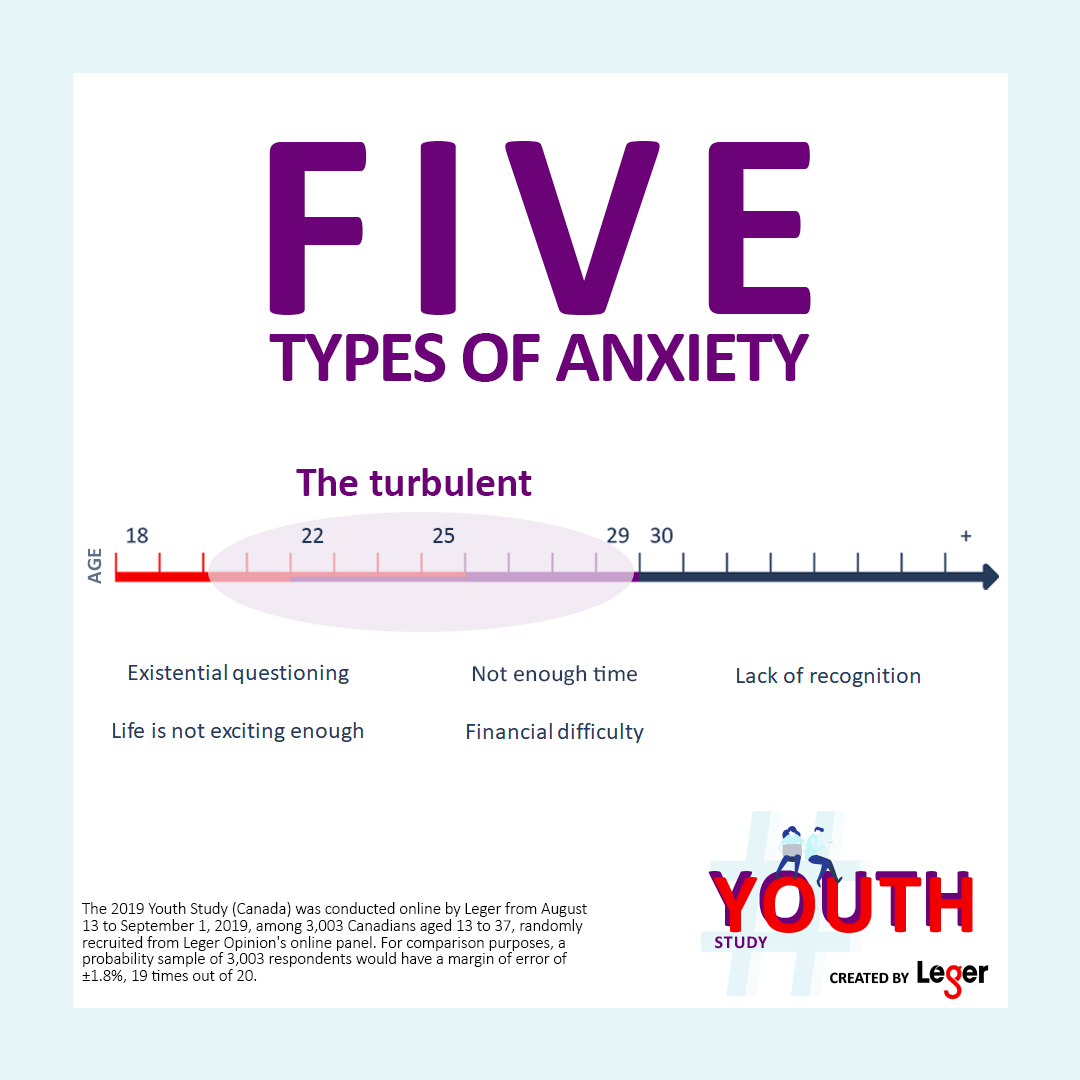Millennials have a reputation for being anxious: a simple Google search for “anxiety generation” brings up a host of links about them in an instant (with some about Generation Z as well).
As part of our recent Youth Study, the largest study of its kind in Canada, which surveyed 3,003 millennials and members of Generation Z, we asked our respondents to self-report whether they have ever experienced anxiety and depression. The findings were concerning. In total…
- 52% reported that they have experienced periods of anxiety
- 43% reported that they have experienced moments of depression
- 22% reported that they have experienced major depression
A 2018 article published by the Canadian Mental Health Association indicates that “over half of Canadians (53%) consider anxiety and depression to be ‘epidemic’ in Canada,” and that this proportion is higher among younger people.[1]
But what are young Canadians anxious about? We asked them in our 2019 Youth Study.
The five types of anxiety experienced by young Canadians…
Based on the results of our study, there are five types of anxiety experienced by young Canadians: existential questions, feeling their lives are boring, the impression they don’t have enough time, financial difficulties, and lack of recognition.
Young Canadians experience different stressors based on their life stage, as may be expected.
- The carefree (aged 13-19) were more likely to be experiencing existential questions, and the feeling that their lives are boring. These sentiments were shared among the younger members of the turbulent generation (age 20-29).
- The turbulent also tended to be more likely to be experiencing financial difficulties, and the sense that they don’t have enough time.
- The stable (age 30-37) were more likely to be facing stressors related to lack of recognition.
More anxiety…more products?
An interesting, and perhaps concerning, development occurring based on the levels of anxiety people are experiencing is the development of products which are designed to help them “cope” with anxiety (such as apps, magnetic bracelets, weighted blankets, etc.), leading to an “anxiety economy” (as mentioned by Sharon Kirkey in the National Post).[2]
In a 2019 article for VICE called How Startups are Selling Anxious Millennials on the Promise of Sleep, Marie Solis, Staff Writer mentions that certain products offer relief from anxiety by promising a good night’s sleep, including weighted blankets and mattresses-in-a-box (both of which are easy to order online and have shipped to your home by clicking a few buttons). She also notes that the marketing techniques of online mattress-in-a-box companies, “appear to target [millennials] directly.”[3] Many companies are aware of the anxiety young Canadians are experiencing, and many young people are looking for products to relieve their stress.
The popularity of products and services related to the well-being of Canada’s youth is not surprising. These are generations that are actually more stressed than ever before, and they are looking for ways to unwind and relax. Among the 40 or so activities presented to respondents in our Youth Study, wellness-related activities, including outdoor activities, going out with friends for dinner, yoga and festivals, are the most popular among 13-37 year olds.
Other companies are taking a different approach. For example, earlier this year, Instagram ran a test in a few countries (including Canada). They removed the number of likes shown under each photo posted by users, meaning that only the users themselves can see how many likes their photos receive (when previously, the number of likes were indicated under each photo). Adam Mosseri (Instagram chief) mentioned that Instagram “want[ed] people to worry a little bit less about how many likes they’re getting on Instagram and spend a bit more time connecting with the people they care about.”[4]
It remains to be seen whether in the future, young Canadians will experience higher or lower levels of anxiety, and how companies will respond. One of the biggest challenges for companies who want to speak to younger generations is whether their company can play a role in helping young Canadians feel better, and if so, what the best strategy to achieve this goal is.
WANT TO LEARN MORE ABOUT THE PERSPECTIVES OF YOUNG CANADIANS? CONTACT US!
READ OUR OTHER ARTICLES ABOUT THE 2019 YOUTH STUDY
- Analyzing young Canadians– who are they really?
- The first time– how old are young Canadians when they make their first purchases?
ABOUT THIS STUDY
The 2019 Youth Study (Canada) was conducted online by Leger from August 13 to September 1, 2019, among 3,003 Canadians aged 13 to 37, randomly recruited from Leger Opinion’s online panel. For comparison purposes, a probability sample of 3,003 respondents would have a margin of error of ±1.8%, 19 times out of 20.
Sources:
[1] https://cmha.ca/documents/over-half-of-canadians-consider-anxiety-and-depression-epidemic
[3] https://www.vice.com/en_us/article/59xb38/millennial-sleeping-habits-anxiety-startups
[4] https://www.bbc.com/news/world-49026935

